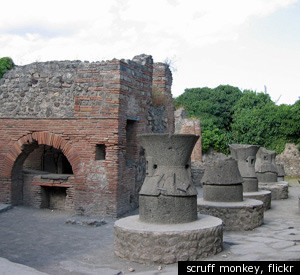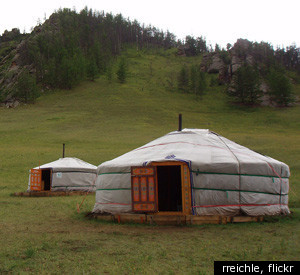
Vacations these days aren't just about how many museum lines it's possible to stand in or finding out how long it takes to get a blistering sunburn, but seeing how much one can get to the heart of a foreign culture. On top of that, some people need more exertion than it takes to dial for room service. To satisfy the craving for both cultural experience and activity, we suggest checking out archaeological digs as vacation destinations.
Every year a number of excavations are carried out around the world, so there is something for every interest. Dig volunteers pay their own way (including airfare) and are provided with food and/or lodging at the site.
Stints can last as little as a week, but be aware that some excavations require a longer commitment.
Here are a few examples of volunteer excavations for different traveler personalities.
Antilles For the Beach Lover
The Netherlands Antilles isn't the first place one thinks of for an archaeological dig, but where else but the Caribbean offers the perfect combination of beach vacation and history? The island of St. Eustatius is notable for its high concentration of colonial period artifacts due to its position as a shipping center between 1760 and 1800. The current project, affiliated with the St. Eustatius Center for Archaeological Research, is focused on a 1740s sugar plantation site.
Volunteers have access to low cost dorm-style housing, or can choose to stay at any of the island's hotels. Food is not included in the cost of the program, but a kitchen is available and deals at local restaurants have been arranged for volunteers. St. Eustatius is a quiet island; much relaxation is done at local bars and scuba diving and snorkeling is encouraged by the program. We even hear the rum is cheaper than water.
Minimum age: 18Dates: Continual sessions between January and SeptemberTime Commitment: 1 week or morePrice: $500 for one week, group discounts availableContact: info@secar.org; +599 524 6770
Ancient Eats For the Foodie
Pompeii is a major Italian tourist attraction, famous for being buried by a volcanic eruption in 79 A.D. The site has offered archaeologists great insight into life in a Roman town, and teams from the University of Maryland, University of Georgia and Western Oregon University seek to understand Pompeiian life through analysis of structures associated with food and drink. Findings will be used to create a Food and Drink in Ancient Pompeii database and ultimately present city planning lessons that can be used in modern times.
Accommodations are offered at the Villa dei Misteri hotel, which offers air conditioning, private baths, maid service and a pool. Breakfast and dinner are served at the hotel and lunch is taken in the field or at a cafeteria. Volunteers are given daily lectures related to the site's history as well as weekly museum trips. Free weekends allow for excursions to nearby towns like Naples.
Minimum age: 18Dates: June 19-25; June 26 - July 2; and July 3-9, 2011Time Commitment: 1 week or more; volunteers cannot stay for only week twoPrice: $1600 per weekContact: info@pompeii-food-and-drink.org; 301-262-1141
 An ancient Pomeiian bakery.
An ancient Pomeiian bakery.
Cavemen For Campers
A joint project between ArchaeoTek Canada and the National Museum of the Eastern Carpathians, the Neolithic settlement excavation invites volunteers to study Europe's Stone Age cultures. The project, based in Pauleni Ciuc, Romania, seeks to understand the relationship between Neolithic peoples and the Carpathian Mountains. This field season, researchers are hoping to inventory the contents of a Neolithic household.
Rugged volunteers will spend two weeks camping in the Carpathian foothills. Be prepared for chilly nights and sporadic rainstorms, but beautiful views of the Ciuc Basin. A nearby village general store offers basic amenities, while buses and cabs allow volunteers access to the regional hub of Miercurea Ciuc. From there transportation is available to other major cities.
Minimum age: 18Dates: June 26- July 30, 2011Time Commitment: 2 weeks or morePrice: $365 registration feeContact: excavation@archaeotek.org
Mongolia For the Adventurer
For those that find Italy and the Caribbean not exotic enough, perhaps Mongolia fits the bill. In the country's central grasslands the University of Pittsburgh and National Museum of Mongolia are working to understand Late Bronze Age and Early Iron Age societies. The site is located among burial and ritual sites dating to the second and first millennia B.C. and this year's fieldwork will focus on unearthing habitation sites.
A unique aspect of this dig is the accommodations. Volunteers will live in yurts (gers), or traditional tent houses used by Mongolian nomads. Modern nomads still inhabit the area and visit the camp, sometimes inviting dig staff back to their own yurts. Each volunteer furnishes their own camping gear and supplies, but meals are provided and prepared by cooks who also do the clean up work. Although registration is closed for this field season, this is a trip worth keeping in mind for the 2012 excavations.
Minimum age: 18Dates: May 23- June 17, 2011Time Commitment: 4 weeksPrice: $1550Contact: jeh48@pitt.edu Mongolian yurts.
Mongolian yurts.
For a comprehensive list, visit the Archaeological Institute of America.